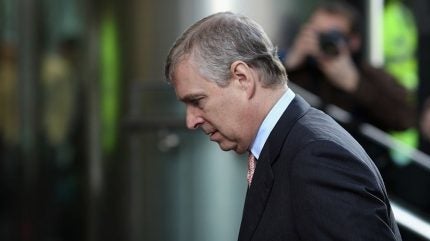
Prince Andrew, the second son of Queen Elizabeth II, has been an Olympic-class generator of bad press over the past decade or more, and especially in recent years. In the latest instalment of ‘What has he done now?’, the Duke of York was stripped of his military roles and royal patronages, including the title ‘His Royal Highness’, as he faces US civil action over sexual assault allegations (which he denies) involving former friend Jeffery Epstein, the American millionaire and convicted sex offender.
With so much drama going around, it is easy to forget that there was a time when Prince Andrew was not a complete pariah, shunned from royal or public duties. In fact, he was placed front and centre of the UK’s global business brand during his decade-long tenure as the UK’s Special Representative for International Trade and Investment (an office reserved for royals only). This stint was not without its own controversies, however.
The not-so grand old Duke of York
In his capacity as trade envoy, Prince Andrew displayed a unique talent for wreaking reputational damage on the Royal Family, and by consequence, the UK’s international brand too (both are inextricably linked). Known as ‘Air Miles Andy’ due to his penchant for luxury travel on the public purse, the prince approached the role with enthusiasm but not, unfortunately, judiciousness.
In the name of business, and one the world’s oldest liberal democracies, the Duke of York took it upon himself to rub shoulders and shake hands with any human dollar sign, ethics and reputational risk assessments flying out the window. That such a questionable character was a UK business ambassador for an entire decade, once again, brings into question the dangers of royal appointees in public service and, more specifically, the glaring lack of meritocracy.
For example, there are his much-criticised links with secretive Luxembourg banker David Rowland. There are also the Wikileaks allegations that he shook his fist against British anti-corruption investigators who were ‘derailing deals’ with Saudi Arabia and Kyrgyzstan.
His regular trips to Kazakhstan, and his friendship with the president’s son-in-law, also generated criticism in many quarters of the British press, especially when said son-in-law purchased one of Andrew’s homes (given to him by the Queen) for £15m, £3m more than the asking price. The Guardian also reported that he had entertained the son-in-law of the ousted Tunisian president, Zine al-Abidine Ben Ali, at Buckingham Palace.

US Tariffs are shifting - will you react or anticipate?
Don’t let policy changes catch you off guard. Stay proactive with real-time data and expert analysis.
By GlobalDataAnd, of course, Prince Andrew’s inglorious career as trade envoy ended on a crescendo of shame in 2011, when Epstein’s sentencing scandalised Andrew’s well-known friendship with the financier – a relationship that the Duke of York has always maintained was important to his networking role as trade envoy.
Maybe it is no surprise that an unelected and entitled aristo would feel most comfortable with the authoritarian elites of the world, but it was, to put it mildly, not a good look, even if on-brand with the UK’s general modus operandi. He was not the only one in the upper echelons of power in the UK to court investment from undemocratic countries or dodgy sources, although he was particularly flagrant about it.
There is no shortage of global foreign investment to authoritarian regimes, especially from the UK, an uncomfortable (at best) business practice that is facilitated by the Prince Andrews of this world.
Our gracious (and indefatigable) queen
Fortunately for the monarchy, Prince Andrew’s recklessness is offset by positive royal role models, namely Queen Elizabeth II. Since 2011, after which the office of Special Representative for Trade and Investment has not been filled, Queen Elizabeth has become ever more the UK’s informal (royal) business ambassador, despite her already jam-packed schedule and her advancing years (she turns 96 in April).
Recent examples of this include a speech at COP26, and more notably, her high-spirited reception of political and industry leaders (such as Bill Gates) at the Global Investment Summit, hosted at Windsor Castle in late 2021. The UK has plenty of attractions to entice the world’s leading foreign investors, but afternoon tea with the Queen is a priceless and genius stroke of business promotion.
Going back a bit, her cameo in the opening ceremony of the 2012 London Olympics – in which she shared billing with James Bond – was a highlight of the country’s showing on the biggest of world stages. Her public appearances and dealings with the business community, so carefully managed and used to maximum effect, show the benefits of sprinkling stardust on otherwise mundane events, as well as highlighting the importance of the monarchy to the UK’s economy and gargantuan soft power. In many ways, Her Majesty is the UK’s top investment promoter and one of its best weapons in the battle for clout and, with that, investment.
Her son, on the other hand, illustrates how badly deploying royals – if they are the wrong ones – can misfire. Now that Air Miles Andy has been grounded, let us take a lesson from his embarrassing encroachment into the business of trade and investment. Considering the state of UK politics these days, driven largely by caprice and personality, the UK's international brand cannot afford more blundering, ignoble public servants, especially among those that have not even been elected.
For the sake of Brand UK, willy-nilly royal appointees must vehemently remain a thing of the past and stay firmly away from the front lines of foreign direct investment.





